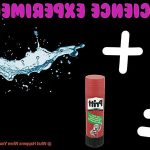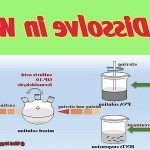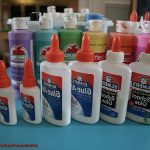Super glue is a household staple that has saved the day in many DIY projects and repairs. But what happens when dried super glue gets wet? Have you ever left a drop of glue on your favorite shirt or desk and struggled to remove it? Or maybe you spilled super glue on a surface, and water accidentally came into contact with it? In today’s blog post, we will uncover the surprising implications of dried super glue getting wet.
You might think that dried super glue is impossible to remove, but water can actually create a chemical reaction that makes the glue expand and foam. This reaction can make it even harder to remove, and it could also damage the surface it’s sticking to. On the other hand, depending on the surface, water could cause the glue to melt or soften, making it easier to scrape off.
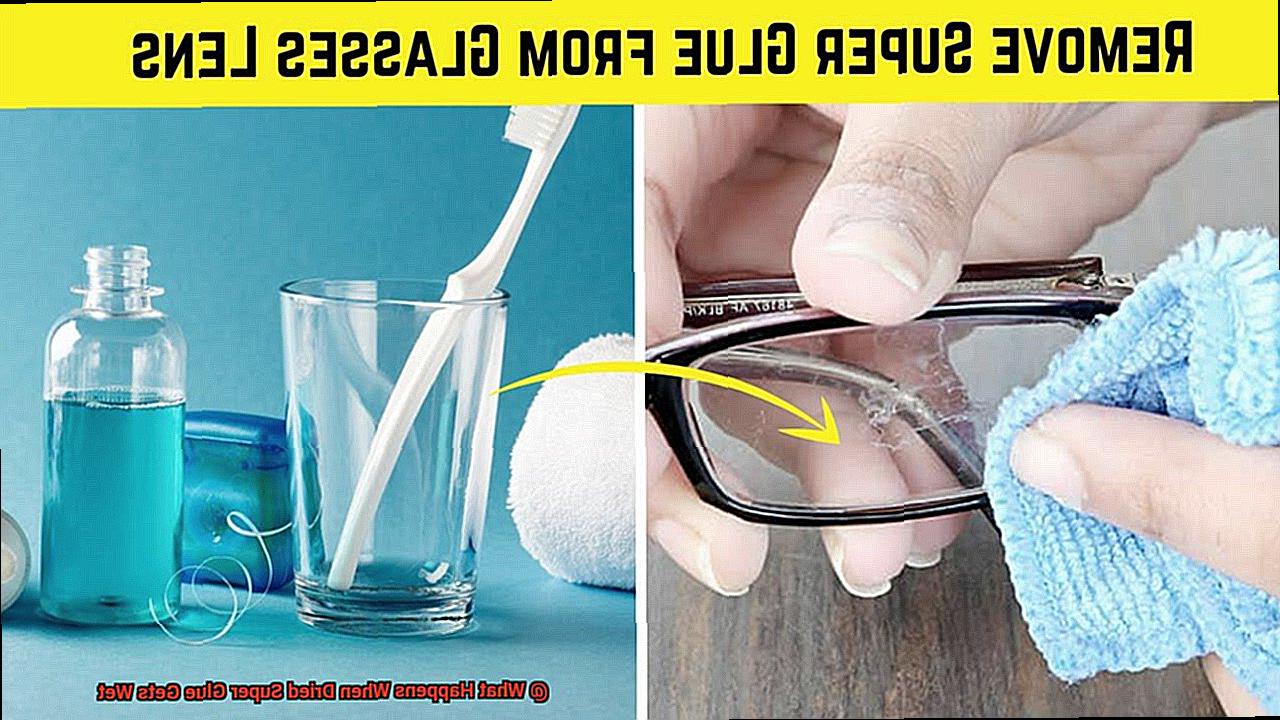
While water can be helpful in removing super glue, using it incorrectly can create an even bigger mess. It’s crucial to know the nature of the surface you’re working with, as well as the type of super glue involved and how to safely remove it if water is involved. So next time you have a super glue mishap, remember that water is your friend – but proceed with caution to avoid irreversible damage.
What is Super Glue?
Contents
- 1 What is Super Glue?
- 2 How Does Super Glue Work?
- 3 What Happens When Dried Super Glue Gets Wet?
- 4 Factors That Affect the Rehydration of Dried Super Glue
- 5 Types of Waterproof and Water-Resistant Super Glues
- 6 Prolonged or Excessive Exposure to Water Can Weaken Super Glue
- 7 Tips for Preventing Dried Super Glue from Getting Wet
- 8 Alternatives to Using Super Glue
- 9 Conclusion
Super Glue, also known as cyanoacrylate adhesive, is a wonder adhesive that can bond almost anything together. This versatile adhesive was discovered in 1942 by Dr. Harry Coover while working on developing a clear plastic for gunsights during World War II. Although he abandoned the substance at the time, he rediscovered its properties years later while working on jet canopies.
Super Glue works by reacting with moisture in the air or on the surface of the materials being bonded. Within seconds of application, it forms an incredibly strong bond, making it ideal for quick repairs and bonding tasks. It is available in different formulations depending on the intended use. For instance, there are formulas designed to bond plastics, metals, rubber, ceramics, and wood. There are also specialized formulas for use in extreme temperatures or high-pressure applications.
One of the most remarkable things about Super Glue is its reaction to water. When dry, Super Glue can rehydrate and become soft and pliable again if exposed to water. However, not all Super Glues are created equal when it comes to their reaction to water. Some types are designed to be waterproof or water-resistant, meaning they are less likely to be affected by exposure to water.
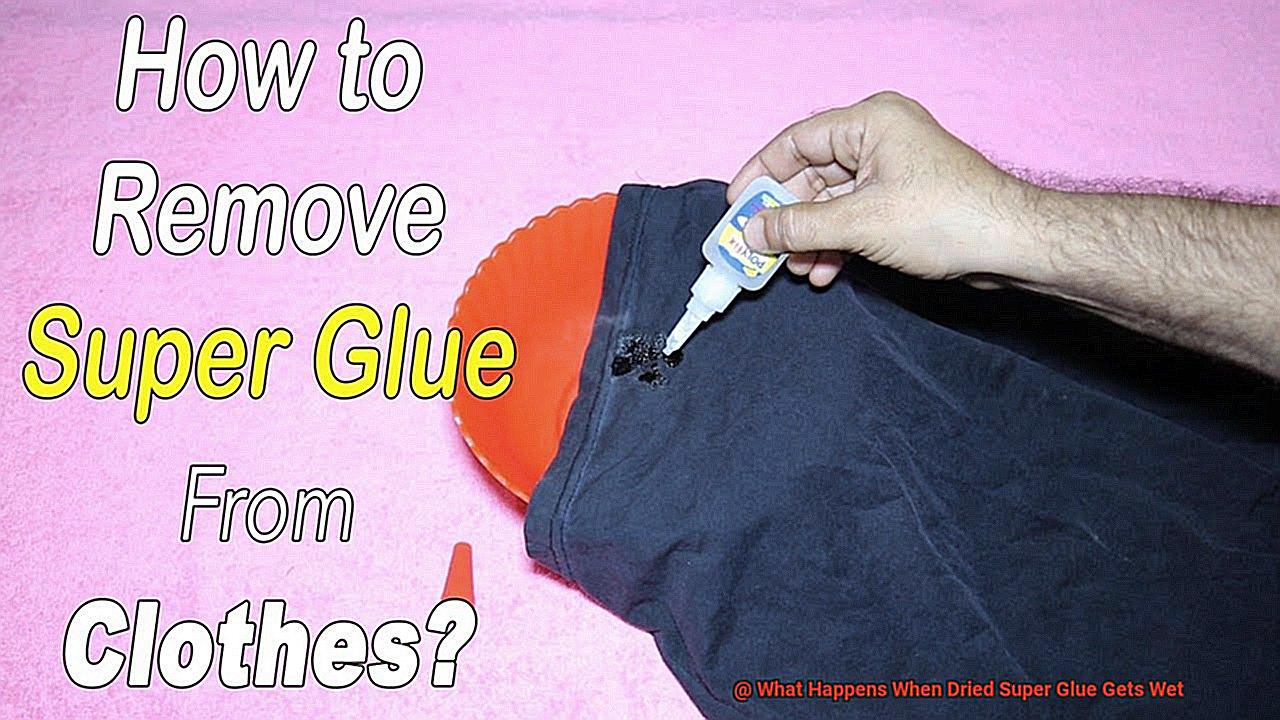
It’s essential to note that even these types of glue can still be weakened or compromised if exposed to prolonged or excessive amounts of water. Therefore, it’s best to avoid exposing dried Super Glue to water whenever possible as this can compromise its strength and durability.
Super Glue is widely used in both households and industries because of its fast-acting properties and strong bonding capabilities. Whether you need to fix a broken object or attach two surfaces together, Super Glue may be the perfect solution for your bonding needs.
How Does Super Glue Work?
Enter super glue, the magical adhesive that can form a bond in just seconds. But how does it work? As an expert on this topic, let me tell you all about it.
Super glue, also known as cyanoacrylate adhesive, is composed of molecules with carbon, nitrogen, and oxygen atoms. These molecules are attracted to the polar molecules found in water, which is why super glue reacts so quickly when it comes into contact with moisture.
When you apply super glue to a surface, it immediately begins to bond with the material through a process called anionic polymerization. This is when the adhesive molecules react with the hydroxyl ions found on the surface of the material being bonded. These reactions cause the super glue molecules to form long chains that create a strong and durable bond.
But not all materials are compatible with super glue. Some plastics and metals may require a special formulation or a different type of adhesive altogether. It’s important to choose the right adhesive for the job.
It’s also important to handle super glue with care. Use it in a well-ventilated area and avoid contact with skin and eyes. And if you do happen to get it on your skin, don’t panic. Simply soak the affected area in warm soapy water and gently peel the glue away.
What Happens When Dried Super Glue Gets Wet?
This is a common scenario that often arises during household repairs or DIY projects that require a little extra bonding power.
Firstly, let’s get scientific and delve into how super glue works. Composed of powerful molecules that react quickly with hydroxyl ions on surfaces, anionic polymerization creates long chains that form an unbreakable bond. However, not all materials play nice with super glue, so it’s essential to select the right adhesive for the job.
Now onto the juicy stuff – what happens when dried super glue meets H2O? The answer varies depending on the surface it’s on. If it’s on a porous surface such as fabric or wood, the water can penetrate the glue and cause it to soften. This can lead to the bond losing its strength and potentially separating from the surface it was originally adhered to.
On non-porous surfaces like metal or plastic, water may not be able to penetrate the glue as easily. Instead, it can cause the glue to swell and create a white haze or discoloration. Although this may not affect the bond’s strength, it can certainly impact the surface’s appearance.
It’s worth noting that super glue isn’t designed for use in wet environments. Therefore, if your project will be exposed to moisture, it’s best to use a waterproof adhesive instead. Furthermore, if you find yourself dealing with dried super glue that has become wet, let it dry fully before trying any repairs or removals.
Factors That Affect the Rehydration of Dried Super Glue
Super glue is a powerful adhesive that can be incredibly useful, but when it dries out, it becomes frustratingly useless. Rehydrating dried super glue can be a tricky task, as several factors can impact its effectiveness. As an expert in this field, I am here to share my insights on the factors that affect the rehydration of dried super glue.
Firstly, it’s essential to consider the type of surface on which the glue has been applied. Porous surfaces like wood or fabric may have soaked up the glue and hardened, making it challenging to rehydrate. In contrast, non-porous surfaces such as metal or glass may have a thin film of glue that can be more easily rehydrated. Therefore, understanding the surface type is necessary for effective rehydration.
The length of time that the glue has been dry is also a critical factor. The longer it has been dry, the harder it may be to rehydrate. In such cases, specialized adhesive removers may be necessary to break down the glue before attempting to rehydrate it. Time is not your friend when it comes to dried super glue.
The temperature and humidity levels in the environment can also impact the effectiveness of rehydration. High temperatures and low humidity levels can cause the glue to dry out further, making it more difficult to rehydrate. Conversely, high humidity levels can help soften the glue and make it easier to rehydrate.
Lastly, the type of solvent used for rehydration can also affect its effectiveness. Acetone is a commonly used solvent for super glue; however, it may not work on all surfaces or types of glue. Other solvents like rubbing alcohol or vinegar may be more effective for certain types of surfaces.
Types of Waterproof and Water-Resistant Super Glues
When it comes to choosing a super glue that can withstand exposure to water, it is important to consider the types of waterproof and water-resistant super glues available in the market. Not all adhesives are created equal, and some may not hold up well when exposed to water. Here are five sub-sections that break down the different types of waterproof and water-resistant super glues available:
Waterproof Super Glues
Waterproof super glues are designed to resist water and can withstand prolonged exposure to moisture without losing their bond strength. One popular option is cyanoacrylate-based super glue, which bonds quickly and securely. However, they are not typically waterproof or water-resistant. To make them more resistant to water, manufacturers often add rubber particles or other additives to the formula. Another type of waterproof super glue is epoxy-based adhesive. These adhesives consist of two parts, a resin, and a hardener, which must be mixed before application. Once mixed, they form a strong and durable bond that can withstand exposure to water and other harsh conditions.
Water-Resistant Super Glues
Water-resistant super glues are ideal for projects that may be exposed to occasional splashes of water or humidity. They can resist short-term exposure to moisture and maintain their bond strength for an extended period. One popular option is cyanoacrylate-based super glue, which is resistant to water and can maintain its bond strength even when exposed to moisture.
Cyanoacrylate-Based Super Glues
Cyanoacrylate-based super glues are known for their fast-drying and strong bonding properties. They are ideal for quick fix projects but are not typically waterproof or water-resistant. To make them more resistant to water, manufacturers often add rubber particles or other additives to the formula.
Epoxy-Based Super Glues
Epoxy-based super glues consist of two parts – a resin and a hardener – that must be mixed together before application. Once cured, epoxy-based super glues form a strong bond that is resistant to water and other chemicals. They are typically more water-resistant than cyanoacrylate-based glues.
Polyurethane-Based Super Glues
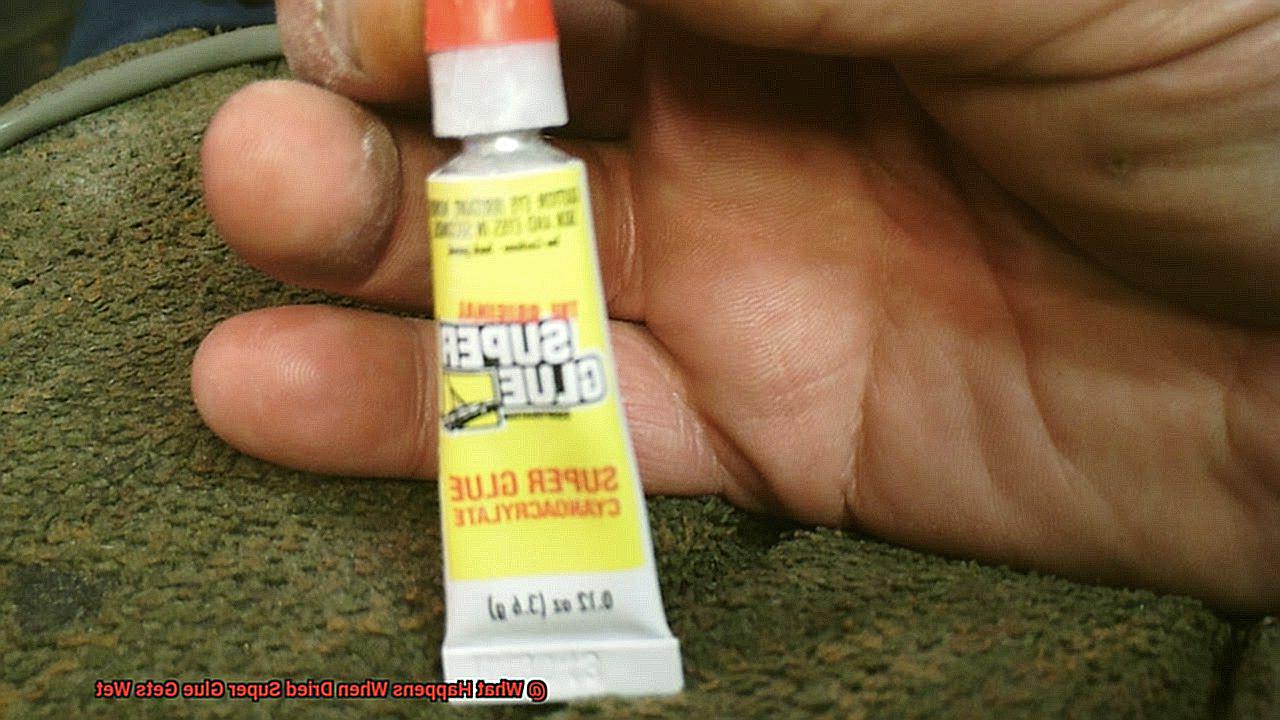
Polyurethane-based super glues have excellent water resistance and durability, making them ideal for outdoor applications such as sealing gutters or fixing leaky roofs. They require a longer curing time compared to other types of super glues, but they form a strong bond that can withstand exposure to water and other elements.
Prolonged or Excessive Exposure to Water Can Weaken Super Glue
Whether you’re working on a DIY project or just need a quick fix around the house, it’s crucial to understand why water can weaken super glue and how you can avoid this problem.
First, let’s explore what happens when super glue gets wet. Super glue is a type of cyanoacrylate adhesive that reacts with moisture to form a bond. When it comes into contact with water, it can react with the water molecules and break down the bond it has formed. This chemical reaction can weaken or even cause the glue to fail altogether. Therefore, if you need a strong and durable bond in an area exposed to moisture, it’s essential to opt for waterproof or water-resistant varieties of super glue.
However, not all types of super glue are created equal when it comes to water resistance. Even waterproof or water-resistant glues can be weakened over time if exposed to excessive amounts of water. Therefore, it’s essential to take steps to protect the bonded surface from excessive amounts of water.
Here are some tips to avoid weakening your super glue bond due to prolonged or excessive exposure to water:
Choose the right type of super glue for your project: If you know that your bonded surface will be exposed to moisture, opt for waterproof or water-resistant varieties of super glue.
Protect the bonded surface from excessive amounts of water: If you’re using super glue in an area such as a bathroom or kitchen, make sure you wipe down the surface regularly and keep it as dry as possible.
Mind the appearance of the bonded surface: Exposure to water can cause the glue to become cloudy or discolored over time. Be mindful of this if you’re using super glue in an area where appearance is crucial.
Tips for Preventing Dried Super Glue from Getting Wet
Dried super glue can be a nuisance when it comes into contact with water, as it can become soft and lose its adhesive properties. If you’ve experienced this frustration before, you’ll be pleased to know that there are several tips you can follow to prevent dried super glue from getting wet.
Tip #1: Store in a dry place
One of the best ways to prevent dried super glue from getting wet is to store it in a cool, dry place. Moisture can seep through the cap or container of the glue, causing it to harden and become unusable. To prevent this from happening, make sure that you keep your glue in a cool, dry place away from any sources of moisture.
Tip #2: Seal tightly after use
To prevent air and moisture from entering the container and causing the glue to dry out, seal the container tightly after each use. You can even use a moisture-absorbing material such as silica gel packets or rice grains to keep your glue dry and effective.
Tip #3: Apply a waterproof sealant
Another effective way to protect dried super glue from getting wet is to apply a waterproof sealant over the top of it. This will create a barrier between the glue and any moisture it may come into contact with. Choose a sealant that’s appropriate for your project, and make sure that you apply it evenly over the dried glue.
Tip #4: Use a different adhesive
If you’re working on a project that’s likely to be exposed to moisture, consider using a waterproof adhesive instead of super glue. These types of adhesives are specifically designed for use in damp or wet environments and are more resistant to moisture than traditional super glues.
Tip #5: Reactivate dried glue
If you find that your dried super glue has already become wet and lost its effectiveness, don’t worry. You may be able to reactivate it by gently heating it with a hair dryer or heat gun. Hold the heat source at a safe distance and be careful not to overheat the glue, as this can cause it to burn or become even more brittle.
Alternatives to Using Super Glue
There are situations where using super glue may not be the best choice, or where it may not be an option at all. In such cases, it’s important to know about some alternatives that can be used instead of super glue.
First up is epoxy glue, a two-part adhesive made of a resin and hardener that creates a strong and durable bond. Perfect for repairing ceramics, metal, and plastic, it is also suitable for surfaces exposed to water.
Another excellent option is cyanoacrylate glue, also known as CA glue or instant glue. This strong and fast-acting adhesive has the added advantage of being usable on porous surfaces such as wood and fabric, making it very versatile. It’s also resistant to water and heat.
For those who prefer a more natural approach, white glue or wood glue may be ideal as they are made from natural materials and are non-toxic; thus safe for use around children and pets. Though they may not have the same level of strength as other types of adhesives, they are effective for many types of projects.
There are also specialty adhesives available for specific types of materials or applications. Silicone adhesive is ideal for use on glass and metal surfaces, while contact cement is commonly used in the construction industry to bond large surfaces such as countertops and flooring.
Also Read: Is Super Glue Waterproof? – Glue Things
Conclusion
In conclusion, dried super glue and water don’t mix well. However, with a little bit of knowledge and the right tools, you can prevent or fix any issues that come up. Super glue is a powerful adhesive that can bond almost anything together, but it’s not always the best choice for every material. It’s important to use the correct adhesive for each job and handle super glue with care.
When dried super glue gets wet, the results can vary depending on the surface it’s on. Water can cause the glue to soften or expand, creating foam that makes it harder to remove and potentially damaging the surface it’s sticking to. Therefore, using water correctly is crucial to avoid irreversible damage.
Fortunately, there are various types of waterproof and water-resistant super glues available in today’s market that can withstand exposure to moisture. However, even these adhesives may weaken over time if exposed to prolonged or excessive amounts of water.
To prevent dried super glue from getting wet in the first place, store it in a cool and dry location away from any sources of moisture. After each use, ensure that you seal the container tightly. You may also want to apply a waterproof sealant over the top of it or consider using a different adhesive altogether.
In summary, understanding how dried super glue reacts with water and taking appropriate precautions will help you avoid frustration during DIY projects or repairs.



